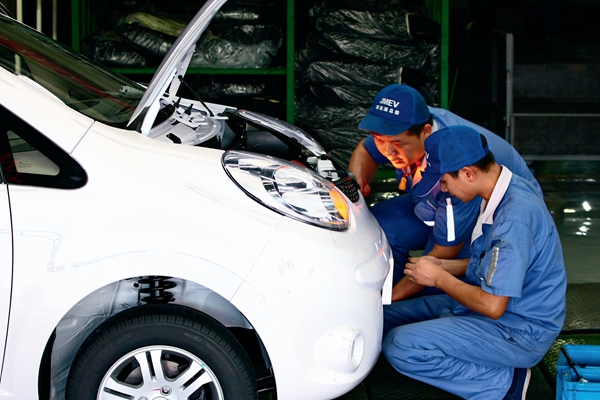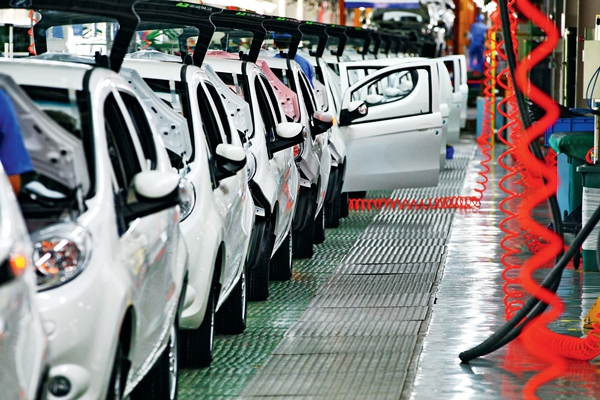China's new energy vehicle boom
 0 Comment(s)
0 Comment(s) Print
Print E-mail China Today, November 08, 2017
E-mail China Today, November 08, 2017
In a bid to support green transportation, China has implemented a series of programs to boost the market for new energy vehicles, or NEVs, since 2010. Governmental subsidies are available for the purchase of NEVs. In some cities, NEVs are exempted from the license-plate lottery or traffic restrictions which are aimed at easing traffic congestions. Recently, encouraged by favorable policies, China's NEV industry has made and continues to make giant progress. According to the E-mobility Index, jointly released by German consultancy Roland Berger and automobile study institution Forschungsgesellschaft Kraftfahrwesen mbH Aachen, China achieved its first top ranking in the global electric vehicle development index in the second quarter of 2017.

Jiangling Motors Co., Group in Jiangxi Province is one of the contributors in this field. At present, the group is able to produce 30,000 NEVs each year. Meantime, a number of Chinese companies that manufacture NEV materials, key parts, and charging facilities have emerged. It is estimated that the annual manufacturing capacity for NEVs in Jiangxi Province will reach one million and the main business income generated by this industry will stand at RMB 100 billion in the year 2025.
Green industry draws more talents
Last August, 10 experts specializing in various fields received letters of appointment from the mayor of Nanchang, the provincial capital. Jiangling Group's New Energy Vehicle Company is among the local enterprises to have benefited from these extraordinary professionals.
Liu Junyu, in his early 30s, is the manager of the experiment center of the Jiangling Group's battery, motor, and eletronic control unit. After obtaining his master's degree in electromechanical engineering and new energy in France, he returned to his hometown, Nanchang, where Jiangling is a household name. He joined the company to lead a team of young engineers to develop NEV technologies.

"I developed an interest in NEVs during my undergraduate studies," Liu Junyu recalled. "Having finished my postgraduate study, I applied for a position in Jiangling as soon as I saw the job vacancy."
Established in January 2015, the New Energy Vehicle Company of the Jiangling Group deems talents as invaluable assets and encourages them to give full play to their ingenuity. Liu Junyu appreciates this philosophy, so he recommended his fellow students in France to the company. "The advanced platform built by the company motivates every one of us to give our utmost to our work as we have confidence in this promising career," Liu said.
Each October, Jiangling Group holds a large-scale conference to reward staff who have made technological breakthroughs so as to encourage more innovations. According to Qiu Tiangao, chairman of the Jiangling Group, the company strives to build a team of professionals specializing in technological innovations. By discovering, nurturing, and attracting more talents, the company aims to pool experts with in-depth knowledge and clear perceptions on technological development trends.
Innovation sets a solid foundation
The establishment of the experiment center for battery, motor, and electronic control unit in April 2016 is a milestone for the innovative development of the Jiangling Group's New Energy Vehicle Company. As a member of the founding group, Liu Junyu worked hard to solve various problems in setting technical criteria, most of which had been absent in China. He looked up an array of international research papers and led his team to carry out tests over and over again to create a set of standards. Furthermore, he initiated a research project on motor controllers and has achieved substantial progress.
The battery, motor, and electronic control unit constitute the biggest distinction between NEVs and gas-powered cars. "The experiment center itself represents an innovation," Liu Junyu said. "It is the only one of its kind in Jiangxi Province and one of the few on such a large scale in the country." He revealed that tens of millions of yuan have been input to support the research and development of this experiment center.
Last December, Jiangling was given approval by China's National Development and Reform Commission to launch a program which allows the company a manufacturing capacity of 50,000 pure electric cars per year, making it among the first batch of domestic companies qualified for independent NEV production. In addition to technologies, norms and methods are underlined by the company. "For instance, I am working on adapting a number of German standards to suit our company and China," Liu Junyu said.
Liu Nianfeng, a board member of the Jiangling Group and general manager of the group's New Energy Vehicle Company, noted that cutting-edge techniques and resources in various sectors are expected to improve pure electric cars and popularize them among the public. Moreover, Jiangling endeavors to play a leading role in promoting green transportation and improving life quality by better developing NEVs featuring advanced technologies, innovative concepts, and more affordable prices.
A bright future
The E-mobility Index aforementioned showed that the market share for electric cars and battery manufacturing in China will continue rising regardless of a decrease in government subsidies. As a matter of fact, the country is reducing its subsidies for NEVs at a rate of 20 percent on a yearly basis. But even though the subsidies might cease by 2020, the industry will keep prospering.
Fast development of the NEV industrial chain has achieved costs reduction in an all-round way. Take batteries – the core part – as an example. Their costs formerly accounted for over half that of a complete NEV. But today, government subsidies have spurred the number and production capacity of battery factories, which have accordingly reduced battery costs.
The lighter weight of the vehicle can also lower the costs. Liu Junyu explained that a car weighing 1.5 tons uses 20 kWh of electricity to go 150 kilometers. But when the weight is decreased to one ton, it saves five kWh of electricity and 10 percent of the total costs to go the same distance. "However, safety is always the top priority," Liu said. "No matter what materials are used to lighten the car body – aluminum, carbon fiber, or composite materials – they must meet the national standards for collision safety."
Setting the prices between RMB 40,000 and 60,000, Jiangling's E Series NEVs are targeted at a wide range of customers. "We have moreover launched the Q Series to attract middle- and upper-income customers," Liu Junyu said. To some extent, the Q Series is comparable to some internationally developed NEVs.
Liu Junyu is confident about the future of China's NEV industry. He observed that car sales have been growing dramatically in small cities and towns across the country. "An NEV usually costs less than RMB 0.05 per kilometer whereas a gas powered car costs RMB 0.5 per kilometer," Liu said. "Besides, regular maintenance for the engine, gearbox, fuel filter and so on are required for a gas car. But more money could be saved in the maintenance of an NEV." Therefore, he believes that wider markets in China will welcome NEVs.
On the other hand, NEVs manufactured in China have established a global reputation. For instance, another major vehicle manufacturer in Jiangxi Province is the CHTC Bonluck Bus Co., Ltd. It is the first Chinese bus manufacturer to export new energy buses and school buses to developed countries. Jiangling Group's New Energy Vehicle Company and CHTC Bonluck Co., Ltd. account for 80 percent of the NEV market share in Jiangxi Province.






Go to Forum >>0 Comment(s)